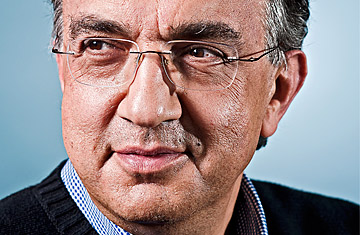
Sergio Marchionn at Chrysler headquarters in Auburn Hills, Mich.
Ask any of the 11,000 people bustling around the Auburn Hills, Mich., headquarters of Chrysler Group why the automaker the U.S. government thought couldn't possibly survive now can't possibly fail, and the answer is "Because we have Sergio."
Cross the Atlantic to Torino, Italy, and ask a similar question about the future of Fiat, Chrysler's majority owner, and you get this: "Because we have Marchionne."
The difference is purely cultural--Americans use first names to refer to colleagues; Italians prefer last names. But they are talking about the same guy: Sergio Marchionne, the Man Who Saved the Car Business.
The boss of Chrysler, Fiat and Fiat Industrial is one very unusual management mosaic: a cigarette-puffing, music-loving, gadget-obsessed, speed-demon Italo-Canadian lawyer and accountant who has revived iconic but dysfunctional automobile companies on both sides of the Atlantic. Not only has Marchionne restored Chrysler, a bankrupt wreck three years ago, but he's also preserved and created thousands of precious manufacturing jobs in the U.S.
Fiat's small-car prowess, engine technology and superior manufacturing capability was a perfect complement to Chrysler's remaining minivan, SUV and big-engine-pickup-truck strengths. "There were things that Fiat had, that I had, that if applied here could have pulled this out," Marchionne explains. "I knew I could help technically. And I had a guy who was willing to fund it."
A guy named Obama. Sales at Chrysler Group--which includes Chrysler, Dodge, Ram and Jeep--are up 23% through the third quarter of 2011 and are expected to hit $55 billion for the year. Chrysler was losing $1 billion a month in 2009; now its operating profit could reach $5 billion. Sales increased 45% in November over the prior year, driven by hot models such as the Jeep Grand Cherokee, Ram pickups and the Chrysler 200. In May Chrysler transferred $5.9 billion to the U.S. Treasury, paying off the bailout loans six years ahead of schedule and silencing many of the critics of President Obama's auto-industry-bailout plan. "I don't think that people really understand what the implications would have been of a lack of decisiveness at that point in time," says Marchionne. "It would have been a mess."
That it isn't speaks not only to the bailout's benefits, particularly in the industrial Midwest and with unemployment still near 9%, but also to the lasting importance of manufacturing to the U.S. economy. The web of employment tied to autos--from raw-steel and aluminum production to engineering--is not easily duplicated with two-person start-ups.
